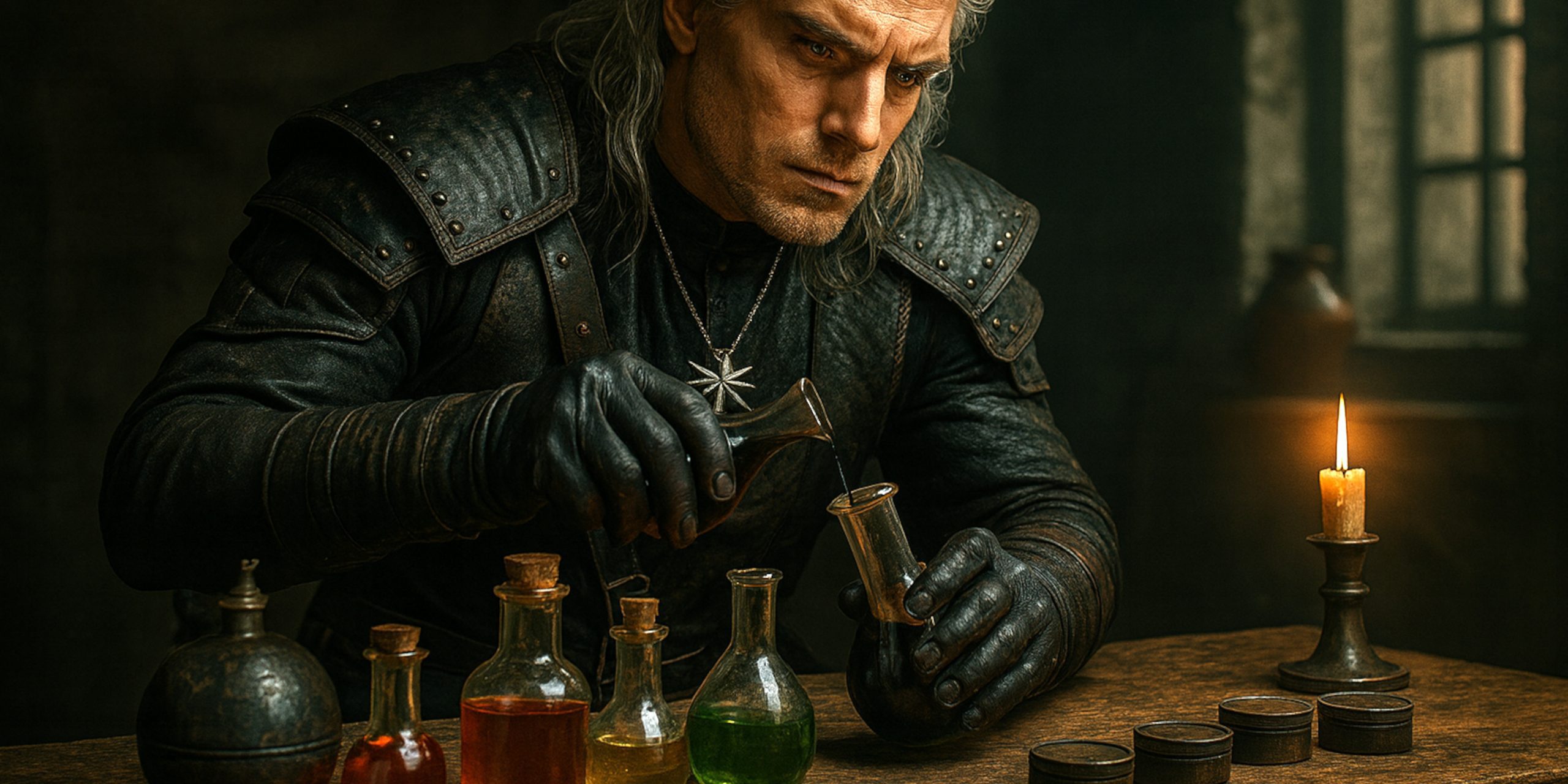
Alchemy is at the heart of what makes a Witcher more than just a skilled swordsman. From the pages of Andrzej Sapkowski’s books to CD Projekt Red’s games and Netflix’s television adaptation, the discipline of alchemy has defined how Witchers survive encounters with monsters. Potions enhance their senses, bombs disrupt or damage foes, and blade oils give an edge against specific creatures. Each medium has shown these tools in action, emphasising their importance in Witcher lore.
Potions
Potions are perhaps the most recognisable aspect of Witcher alchemy. They are dangerous for humans but essential to Witchers, who undergo mutations to tolerate them. In the novels, Geralt’s use of potions is described with detail: his eyes become cat-like in the dark after consuming Cat, while Swallow accelerates healing from grave wounds.
In The Witcher 3: Wild Hunt, players carefully manage potions such as Thunderbolt for increased attack power and Blizzard for heightened reflexes during combat. The Netflix series has shown Geralt drinking potions before facing deadly monsters, with his blackened eyes and slowed breathing visualising their effects for viewers.
Common potions include:
- Swallow: Accelerates healing.
- Cat: Grants night vision.
- Thunderbolt: Boosts attack power.
- Blizzard: Heightens reflexes, often tied to adrenaline.
Bombs
Bombs are the Witcher’s answer to foes that resist conventional tactics. They serve to disorient, damage, or nullify an enemy’s abilities. In Sapkowski’s works, Geralt is shown using explosives against groups of monsters where direct swordplay would be futile.
In The Witcher 3, bombs are central to certain encounters. Grapeshot is effective against nests, while Devil’s Puffball releases toxic fumes to suffocate enemies. The Netflix series has so far shown more reliance on sword combat, but fans anticipate greater use of bombs as the story develops.
Notable bombs include:
- Grapeshot: Fragmentation bomb, ideal for nests and groups.
- Dancing Star: Incendiary effect, setting foes aflame.
- Devil’s Puffball: Releases poisonous gas.
- Samum: Emits a blinding flash, stunning opponents.
Blade Oils
Blade oils are one of the most practical aspects of Witcher alchemy. They allow a Witcher to tailor their sword to the enemy at hand, improving effectiveness in battle. The books make frequent reference to Geralt preparing his swords with oils, highlighting his methodical nature.
In the games, oils are key to strategy. Players match oils with monster types, such as Necrophage Oil for ghouls and spectres or Vampire Oil for night-stalking foes. The oils encourage knowledge of the bestiary, rewarding players for studying their enemies.
Examples of oils include:
- Necrophage Oil: Effective against ghouls, drowners, and other corpse-eaters.
- Specter Oil: Useful against wraiths and apparitions.
- Insectoid Oil: Designed for kikimores, arachnomorphs, and similar foes.
- Vampire Oil: Enhances damage against higher vampires and related creatures.
Legacy of Witcher Alchemy
Alchemy is more than a toolset; it represents the discipline and preparation that separate Witchers from ordinary fighters. In Sapkowski’s stories, Geralt’s use of alchemy reinforces his professionalism. The games turn alchemy into a tactical system, rewarding knowledge and resource management. The series presents alchemy in striking visual form, allowing viewers to witness its unsettling effects on Witchers.
Through potions, bombs, and oils, alchemy has become one of the defining features of the Witcher universe, grounding its magic in something brutal, practical, and deeply dangerous.










